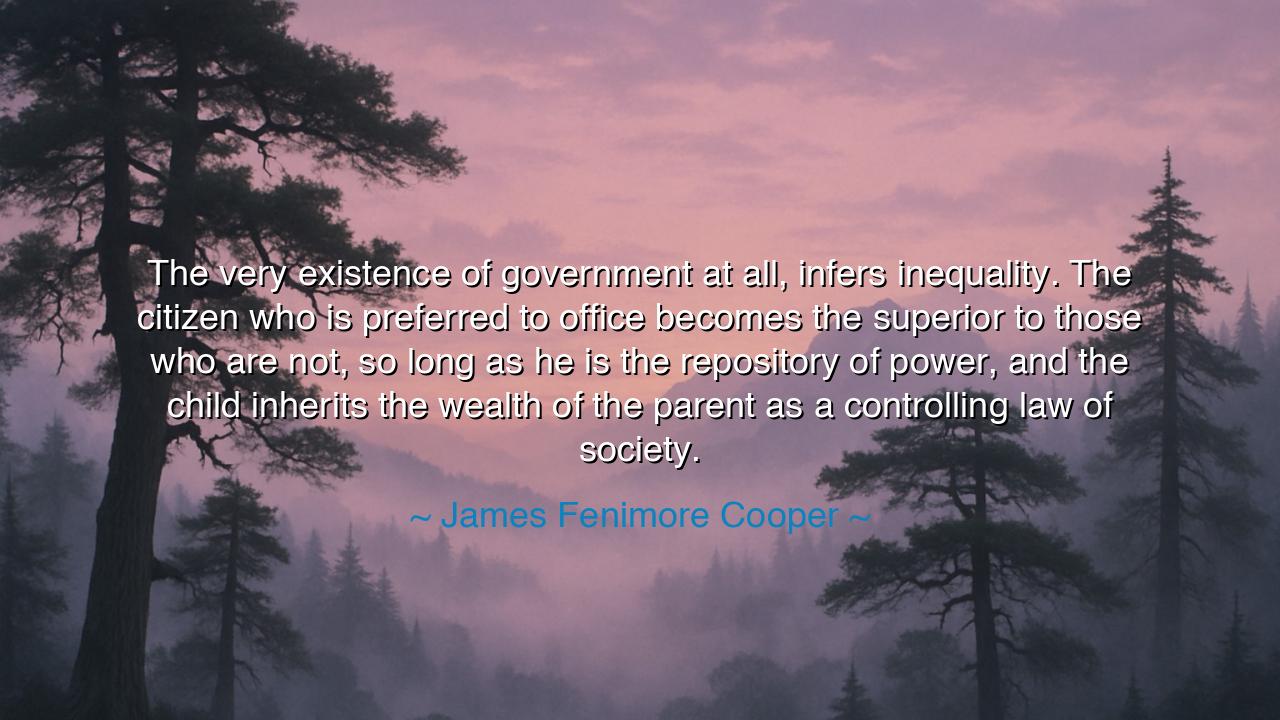
The very existence of government at all, infers inequality. The
The very existence of government at all, infers inequality. The citizen who is preferred to office becomes the superior to those who are not, so long as he is the repository of power, and the child inherits the wealth of the parent as a controlling law of society.






“The very existence of government at all, infers inequality. The citizen who is preferred to office becomes the superior to those who are not, so long as he is the repository of power, and the child inherits the wealth of the parent as a controlling law of society.” Thus wrote James Fenimore Cooper, the novelist and philosopher of the early American spirit, a man who saw not only the frontier of land but the frontier of ideas. His words, both piercing and eternal, unveil the paradox at the heart of civilization — that the moment order is born, equality dies. He did not condemn this truth, but revealed it, that mankind might learn to live wisely within its shadow. For power, though necessary, carries with it a chain invisible yet heavy: the chain of inequality.
In this passage, Cooper speaks of a truth older than kings — that government itself, by its nature, divides. When a man is chosen to rule, he stands above those he governs, and thus the pure equality of nature is broken. The citizen preferred to office becomes not merely another soul among equals, but the superior, so long as he holds authority. Power, even when righteous, creates distance. It lifts one voice above the chorus, one will above the multitude. Yet without this, chaos would reign, and so humanity accepts inequality as the price of peace. In this, Cooper’s insight is both sorrowful and wise: that governance and inequality are twins, born of the same mother — necessity.
To grasp this truth, one must look back to the earliest societies. In the beginning, men gathered around the fire as equals, but soon the strong or the wise rose to lead. The first chieftain was chosen not by arrogance but by need — the tribe required order. Yet once the mantle was given, power took root, and the seed of inequality was sown. From that seed grew kingdoms, empires, and republics alike. Even in democracy, where all men are said to be equal, those who hold office possess authority beyond their peers. The moment one man commands and another obeys, equality fades, even if justice remains.
Cooper’s vision extends beyond the halls of government into the structure of society itself. He speaks of inheritance — how the child inherits the wealth of the parent, and how this too becomes a law of inequality. Here he shows that power wears many masks: wealth, privilege, birth, or intellect. Even without tyranny, society organizes itself in hierarchies. The noble may fall, and the poor may rise, yet the balance is never perfect. The controlling law of society, he writes, ensures that inequality endures, not because man wills it so, but because human order cannot exist without it.
History bears witness to his claim. Consider the revolutions of France, where the cry of “Liberté, Égalité, Fraternité” rang through the streets like thunder. The monarchy fell, the aristocracy crumbled, and for a moment the world glimpsed the dream of equality. Yet what rose in its place? Another hierarchy — that of the revolutionaries, and then of Napoleon, the emperor who crowned himself above all. The people who sought to destroy inequality built a new form of it. So it has ever been: when power is cast down, it merely changes hands. For as long as men govern, some must rule and others must follow.
Yet Cooper’s words are not a hymn of despair. They are a call to wisdom and humility. To know that inequality is inevitable is not to surrender to injustice, but to be vigilant against its abuse. If government cannot erase the difference between ruler and ruled, then it must restrain it. Those who are “the repository of power” must remember that their superiority is temporary and conditional — a stewardship, not a crown. True virtue in governance lies not in denying inequality, but in governing with restraint, compassion, and respect for the governed. The noble leader is not he who exalts himself, but he who bears the weight of office as a sacred trust.
And so, the lesson for us, O listener, is this: seek not a world without inequality, but a world without arrogance. For the danger is not that power exists, but that it forgets its purpose. A just society must accept that differences of station, wealth, and duty will always exist — yet it must also guard against the corruption that turns difference into domination. Let the powerful remember that their authority is loaned, not owned; let the rich recall that their fortune is responsibility, not privilege.
In every age, balance must be struck between freedom and order, between equality and structure. The wise do not dream of erasing inequality, for that is to dream of unmaking humanity itself. Instead, they strive to make power honorable, wealth useful, and leadership humble. Thus, in the words of Cooper, we find a truth both stern and sacred: that while inequality is the law of government, justice must be the law of the heart. Only then can mankind live with power and yet remain free.






AAdministratorAdministrator
Welcome, honored guests. Please leave a comment, we will respond soon